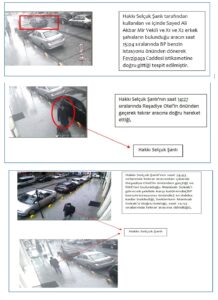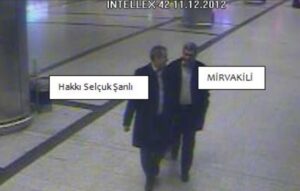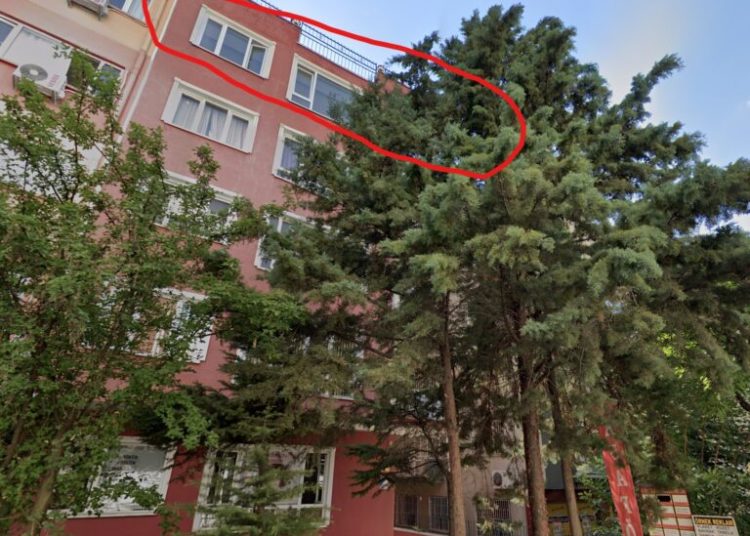Abdullah Bozkurt/Stockholm
A convicted militant who has been working for the Islamic Revolutionary Guard Corps (IRGC) Quds Force set up a cell in the Turkish capital to radicalize young people, a classified intelligence report obtained by Nordic Monitor has revealed.
Hakkı Selçuk Şanlı, a Turkish national who served prison time for helping set up the Quds Force network in the 1990s under the orders of then-IRGC general Nasir Takipur, was put to use again by his handlers after keeping a low profile for years. As part of one of his assignments from Iran’s notorious intelligence service, he was directed to open a shop in Turkey’s capital of Ankara, registered in his son’s name, in order to recruit new assets on behalf of the Quds Force.
Şanlı was arrested on May 13, 2000 and was sentenced to 12 years, six months in prison for involvement in terrorist plots targeting Turkish and US interests. But he was freed in 2004 when the government of then-Prime Minister and now President Recep Tayyip Erdoğan pushed an amnesty bill through Parliament, reducing sentences for some convicts.
The police in Ankara were alerted to Şanlı’s new scheme when a woman named Elife Ravanoğlu complained about what she described as a coffeehouse that she said her son Mustafa Özcan Ravanoğlu had been frequenting for some time where he was being brainwashed with radical ideology propagandized by clerics from Iran.
The record of a complaint filed by a mother whose son was lured to a propaganda house in Ankara that was run for the Quds Force by the family member of a convicted terrorist:
“People from Iran are spreading Shia propaganda [in this shop], and my son is among those who frequents the place. They say they were converted to Shiites and that they will now kill Sunnis,” she told the police on the phone on September 21, 2012. She added that university students and high school seniors were lured to the place and asked the police to either get it under control or shut it down.
The record of the complaint was then referred to the police counterterrorism bureau, which investigated the claims and prepared a preliminary report based on initial findings on September 26, 2012. The venue, the Mekan Kitap Evi, listed a bookstore that also functioned as a coffeehouse, was located on the top floor of a commercial building at an address listed as İnkılap Sokak No:26/ll, not far from a number of government buildings and the Turkish Parliament.
It was registered under the name of Şanlı’s son, Yusuf Şanlı, with the Çankaya district municipality.
The report noted that the bookstore was full of books on Shiite ideology and posters of Iranian clerics. A registry was set up for visitors to borrow books free of charge. The only registered employee for the place of business was Şanlı’s wife, Şükran. Although the business hours were listed as 07:00-20:00, it was open until the late hours and at times until morning.

The police also interviewed Yusuf, who described himself as a “political Islamist” who worked with a group called Genç Birikimler (Youth Depository). He admitted that radicals, even those affiliated with al-Qaeda, went to the bookstore, and that Shiite propaganda might have been spread by some visitors.
Police interviewed municipal officials, local residents and business owners in the area and concluded that the place was not known, confirming that it was not actually open to the public but rather served as a safe space for special visitors. When the police went to the bookstore for an inspection, there were no Iranian visitors. But they verified that many Iranians actually stayed in nearby hotels.
The police concluded in its assessment that the allegations made by the complainant appeared to have checked out. It further referred the case to a special section in the counterterrorism department that was monitoring radical religious groups in Turkey.
Preliminary report filed by the police on a propaganda site maintained in the Turkish capital by the Quds Force:
While police were looking into allegations about Şanlı in Ankara, a prosecutor in Istanbul had already listed him as a suspect and was investigating him as part of a confidential probe into IRGC Quds Force cells. He was red-flagged in the case, which was launched in 2011, and dozens of Iranian nationals including diplomats were put under surveillance and their phones wiretapped. Police investigators found that Şanlı was secretly meeting IRGC general Sayed Ali Akber Mir Vakili and running operations under the general’s orders.
The police managed to plant a listening device on Şanlı’s car after securing a warrant from a judge just before he met with Mir Vakili on June 18, 2013. The IRGC general, who was not aware that the car was bugged, told Şanlı how Hakan Fidan, the head of Turkey’s National Intelligence Organization (MIT) and a long-time Iranian asset, leaked confidential information about the conversation in the Turkish Cabinet. The transcript of the wiretap was included in the Quds Force terrorism case.

The investigation also showed how Şanlı worked with Levent Balkan, a former executive of Turkey’s state lender Halkbank, in assembling a team and setting up a clandestine scheme to launder money for the IRGC. Turkish investigators recorded the meetings of Balkan, Şanlı and Mir Vakili as the three discussed the scheme to move funds through Turkey. Balkan was also indicted in September 2017 by US federal prosecutors for participating in a major conspiracy to violate US sanctions on Iran.
The IRGC Quds Force case in Turkey never went to trial because the Erdoğan government hushed it up in February 2014 after learning about the probe, which clearly incriminated senior government officials. The investigating prosecutor was sacked before he had a chance to secure detention warrants for the suspects and file an indictment. Şanlı escaped from the long arm of the justice thanks to the intervention of Erdoğan, who apparently protected pro-Iranian assets and helped IRGC Quds Force handlers escape from Turkey.
2001 Indictment of Hakkı Selçuk Şanlı explains how he was recruited by the IRGC Quds Force in the 1980s and involved in terror plots:
Şanlı’s rap sheet as detailed in a September 2001 indictment filed by prosecutor Hamza Keleş shows that he was first recruited in 1984 by a group known as Tevhid, a pro-Iran outfit set up by Iranian intelligence in Turkey. The group, clustered around Iranian propaganda magazine Tevhid, aimed to establish an Islamic regime similar to that in Iran. In 1986 the Quds Force used some members of the group for purposes of espionage and transporting explosives. Şanlı was a key operative who traveled between Turkey and Iran many times, trained by the Quds Force and involved in a series of terror plots.
In one incident his Iranian handler, Quds Force general Nasir Takipur (or Takizade), was sought after explosives smuggled into Turkey from Syria were seized by the police in the border province of Hatay. Şanlı helped Takipur evade the police and provided shelter for him in Istanbul.
In a statement to the police, Şanlı admitted that the Quds Force sought his help in 1988 to plant explosives at the Saudi American Bank, located in Istanbul’s Harbiye neighborhood. The plan was executed under orders from Takipur on March 10, 1988, and a bomb planted next to the bank caused damage to the surroundings but no causalities.
IRGC Quds Force set up a shop in Turkey’s capital to recruit militants including al-Qaeda aspirants




